Have you ever found yourself standing in front of your chicken coop, a bag of horse feed in hand, and wondered, can chickens eat horse feed? It’s a question I’ve asked myself more than once, especially when my horses and chickens share the same space. As a fellow chicken enthusiast, I understand the desire to make the most out of our resources, but ensuring we’re making the right choices for our feathery friends is essential.
The short answer to this burning question is that feeding chickens horse feed as their primary diet is not ideal. Chickens have specific nutritional requirements that differ from those of horses, and a diet based on horse feed could lead to nutrient imbalances and health issues. However, don’t worry! This doesn’t mean your chickens can’t enjoy a little horse feed as an occasional treat.
In this article, we’ll explore why horse feed isn’t the best choice for chickens, discuss potential risks, and suggest alternative treats and supplements to keep your chickens healthy and happy. We’ll also cover how you can safely feed horse feed to your chickens in moderation, as well as tips for maintaining a thriving chicken flock. So let’s dive in and give you the information you need to make the best decisions for your chickens!
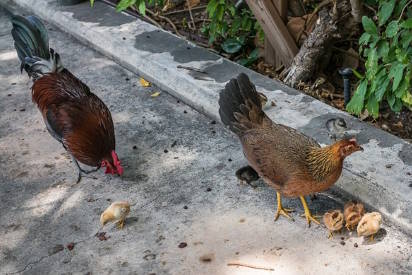
Understanding Horse Feed Ingredients
So, you’re curious if chickens can eat horse feed? Before we dive into that, let’s look at what’s actually in horse feed. Horse feed typically consists of grains such as oats, corn, or barley, which provide energy.
It also contains vitamins and minerals for overall health and fiber sources like beet pulp or alfalfa to help with digestion. Lastly, horse feed often includes protein for muscle development and maintenance.
[ChickenAffiliate]
Nutritional Requirements of Chickens
Now that we know what’s in horse feed let’s talk about chickens’ dietary needs. Chickens require a specific balance of nutrients for optimal health, and their needs are quite different from horses.
For example, they need a good amount of protein for growth, egg production, and essential vitamins and minerals. Calcium, in particular, is crucial for strong eggshells and healthy bones.
Potential Risks of Feeding Chickens Horse Feed
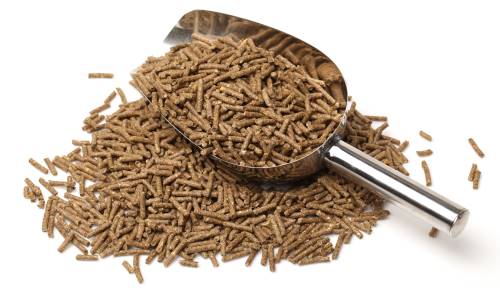
Alright, it’s time to tackle the big question – can chickens eat horse feed? The short answer is: it’s not ideal. Here’s why.
Inappropriate nutrient ratios
Horse feed is formulated with a horse’s nutritional needs in mind, not a chicken’s. This means that the balance of nutrients in horse feed might not be suitable for chickens. For instance, it may not have enough calcium for egg-laying hens, leading to weak eggshells and other health issues.
Excess protein intake
While protein is essential for chickens, too much can cause health problems. Horse feed tends to have higher protein levels than chickens require, and feeding it to your chickens might result in kidney issues or other complications.
Insufficient calcium and other minerals
As mentioned earlier, chickens need calcium for strong eggshells and bones. Horse feed may not provide enough calcium, which can harm your chickens in the long run.
Harmful additives or ingredients
Some horse feeds may contain additives or ingredients that are fine for horses but unsafe for chickens. For example, certain medications or supplements in horse feed could be toxic to chickens.
Feeding Chickens Horse Feed in Moderation
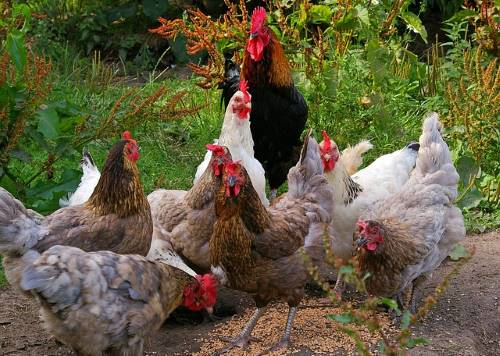
Now, this doesn’t mean that your chickens can’t ever enjoy some horse feed as an occasional treat. In fact, they might like it! The key is moderation. Here are some tips to remember if you give your chickens a little horse feed now and then.
- Occasional treats versus staple diet: Remember that horse feed should never replace a balanced chicken diet. It can be an occasional treat, but chickens should primarily be fed a diet specifically designed for their nutritional needs.
- Assessing the quality of horse feed: Not all horse feeds are created equal. Ensure you know the ingredients and nutritional content of the horse feed you’re giving your chickens. Avoid any horse feeds with harmful additives or ingredients.
- Mixing horse feed with other food sources: To minimize the risk of nutrient imbalances, consider mixing small amounts of horse feed with other chicken-safe foods like fruits, vegetables, or grains. This way, your chickens can still enjoy the horse feed without consuming too much of any nutrient.
- Monitoring chicken health and behavior: Keep an eye on your chickens after giving them horse feed. If you notice any changes in their behavior, appetite, or overall health, stop feeding them the horse feed and consult with a veterinarian.
Alternative Treats and Supplements for Chickens
If you’re looking for other ways to spoil your chickens, plenty of chicken-friendly treats and supplements are available. Some great options include:
Nutritious fruits and vegetables
Chickens love fruits and vegetables like apples, berries, leafy greens, and even pumpkins! These can provide essential vitamins and minerals and a tasty change of pace from their regular feed.
Insects and other protein sources
Chickens are natural foragers who enjoy hunting for insects like mealworms, crickets, and even small slugs. Providing these protein-rich snacks can help keep your chickens happy and healthy.
Calcium-rich foods
As we’ve mentioned earlier, calcium is crucial for egg-laying hens. Consider giving your chickens crushed eggshells, oyster shells, or even a calcium supplement designed for poultry to ensure they get enough of this vital mineral.
Commercially available chicken feed options
If you’re looking for a balanced and nutritious diet for your chickens, many commercial chicken feeds are available. These feeds are formulated to meet the specific needs of chickens, so you can rest assured that they’re getting the right balance of nutrients.
Maintaining Healthy and Happy Chickens
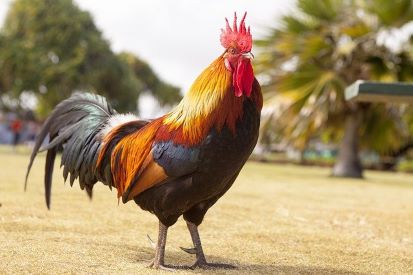
The key to keeping your chickens healthy and happy is to provide them with a clean, safe environment, access to fresh water, and a balanced diet. Here are some tips to help you maintain a thriving chicken flock:
- Providing a clean and safe environment: Ensure your chickens have a clean, dry, well-ventilated coop with ample space to roam and roost. Regularly clean the coop and replace bedding to minimize the risk of disease and pests.
- Ensuring access to fresh water: Chickens need clean water to stay healthy. Ensure they have a constant water supply and clean their water containers regularly to prevent the growth of harmful bacteria.
- Monitoring chicken health regularly: Keep an eye on your chickens for any signs of illness or injury, such as lethargy, loss of appetite, or changes in egg production. Catching issues early can help ensure your chickens receive prompt and effective treatment.
- The benefits of a balanced and varied diet: It is crucial to feed your chickens a diet specifically designed for their nutritional needs. However, supplementing their diet with healthy treats and snacks can provide additional nutrients and keep your chickens engaged and happy.
Creating a Balanced Homemade Chicken Feed Mix with Horse Feed
If you have an abundance of horse feed and would like to use it for your chickens, you can consider creating a homemade chicken feed mix that incorporates some elements of the horse feed. By doing so, you can ensure that your chickens receive a more balanced and nutritious diet. Here are some tips for creating a homemade chicken mix using horse feed.
Calculate the nutrient ratios
Before creating your homemade feed mix, research the nutritional requirements of chickens and calculate the ratios of protein, fiber, vitamins, and minerals needed. This will help you determine how much horse feed can be safely included in the mix without causing imbalances.
Combine horse feed with other ingredients
To provide a balanced diet for your chickens, mix horse feed with other nutrient-rich ingredients such as grains (corn, wheat, barley), legumes (soybeans, peas), seeds (sunflower, flax), and leafy greens. These additional ingredients will help ensure your chickens receive the essential nutrients they need to thrive.
Add a calcium source
Since horse feed may not provide sufficient calcium for egg-laying hens, including a calcium source in your homemade feed mix is crucial. Crushed eggshells, oyster shells, or a calcium supplement designed for poultry are all excellent choices to ensure strong eggshells and healthy bones.
Adjust the mix as needed
After introducing the homemade feed mix:
- Monitor your chickens’ health, egg production, and overall behavior.
- If you notice any issues, adjust the mix’s ingredients accordingly.
- Consult a veterinarian or poultry nutrition expert if unsure about the best adjustments.
Store the feed mix properly
To maintain the freshness and quality of your homemade chicken feed mix, store it in a cool, dry place away from direct sunlight. Use airtight containers to prevent contamination and keep pests at bay.
What Other Feeds Can Chickens Eat?
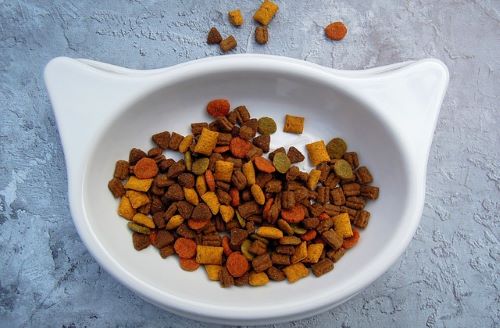
While we’ve established that horse feed can be an occasional treat for chickens, you might wonder what other types of feeds are suitable for your feathered friends. It’s important to know whether these feeds can provide a healthy source of nutrition or pose potential risks. In this section, we’ll explore five other feeds and discuss whether they’re appropriate for chickens to consume.
Dog Food
Although dog food isn’t specifically formulated for chickens, it can be a source of protein and other nutrients. If you offer dog food to your chickens, opt for a high-quality, all-natural brand without harmful additives.
However, remember that dog food should only be given as an occasional treat and not as a primary food source, as it doesn’t meet all the nutritional requirements of chickens.
Read More: Can Chickens Eat Dog Food? The Truth Revealed
Cat Food
Like dog food, cat food can be a source of protein for chickens. However, it’s essential to be cautious when feeding cat food to your flock. Cat food often contains higher levels of protein than what chickens require, which can lead to health problems if consumed in large amounts.
Like dog food, cat food should be offered as an occasional treat, not a main dietary staple.
Read More: Can Chickens Eat Cat Food? Discover The Surprising Answer
Rabbit Food
Rabbit food, which typically consists of pellets made from alfalfa, grains, and other plant materials, can provide fiber and other nutrients for chickens. However, it lacks the necessary protein, vitamins, and minerals for a chicken’s health.
Feeding chickens rabbit food as an occasional treat is acceptable, but it should not replace a balanced diet specifically formulated for chickens.
Read More: Can Chickens Eat Rabbit Food? Simple Answer & Feeding Tips
Sweet Feed
Sweet feed, which combines grains, molasses, and other ingredients, is commonly fed to horses and other livestock. While chickens might be attracted to the sweet taste of molasses, sweet feed is not a suitable food source for them.
The high sugar content can lead to obesity and other health problems, and the nutritional composition doesn’t meet a chicken’s specific needs. It’s best to avoid feeding sweet feed to your chickens.
Read More: Can Chickens Eat Sweet Feed? The Surprising Truth Revealed
Goat Feed
Goat feed, similar to horse feed, is not specifically designed for chickens. However, it can be an occasional treat when given in moderation. Goat feed is often rich in vitamins and minerals but may not provide chickens with the optimal balance of nutrients.
As with other non-chicken feeds, it’s important to ensure that goat feed doesn’t contain harmful additives or ingredients. Always prioritize a well-balanced chicken diet and offer goat feed only as an occasional treat.
Read More: Can Chickens Eat Goat Feed? Risks & Alternatives Explained
Can chickens eat horse feed – final thoughts
So, there you have it, fellow chicken lovers! While the tempting thought of feeding chickens horse feed might have crossed your mind, it’s clear that it shouldn’t be their primary source of nutrition. Chickens and horses have different dietary needs, and feeding your chickens horse feed as their main diet could lead to health problems. However, if you’re cautious and use moderation, you can still occasionally treat your chickens to a little taste of horse feed.
In summary, can chickens eat horse feed? Yes, but only as an occasional treat, and always with their overall health and well-being in mind. Remember, a well-balanced diet, a clean environment, and access to fresh water are the keys to raising happy, healthy chickens. With the information and tips in this article, you can confidently make the right choices for your feathery friends and keep your chicken coop clucking with joy!
Related Articles:
